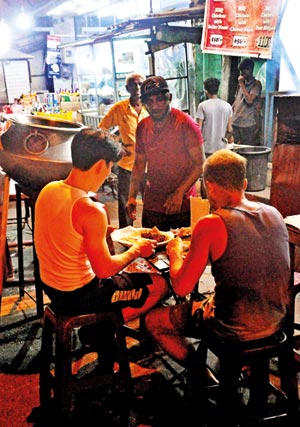News
Different standards for govt. and street vendors in setting prices for visitors

Aluth Kade: Where one finds a diverse mix of customers. Pic by Nilan Maligaspe
The recent incident involving the arrest of a street food vendor in Aluth Kade, Colombo, for allegedly selling food at a higher price has sparked questions about the perceived discrepancy involving the government.
Netizens questioned why the government enforces strict measures against vendors while imposing higher charges for foreigners at tourist sites. Some argue that it is understandable that vendors adjust prices for foreigners to cope with rising operating costs.
SSP Nihal Thalduwa, the police media spokesperson, said the vendor’s arrest stemmed from the incident where he allegedly threatened and insulted the foreigner, who had merely asked about the price of an item. Despite no complaints being filed by locals or the foreigner, the police acted swiftly based on the viral video online.
However, it was only after the arrest that it became apparent the suspect had not been overcharging. The arrest stemmed from his behaviour towards the tourist.
The Sunday Times spoke to the Consumer Affairs Authority (CAA) about whether vendors are allowed to set their own prices. The CEO and Director General, Herath Bandara, said there are no restrictions on what they can charge.
“However, once they fix a price, they cannot charge locals and foreigners differently. This rule under CAA applies only to consumable products,’’ Mr. Bandara said.
“But it is a common practice that we have a price list and we do not charge more from foreigners. For example, no one has a different price scheme for a piece of cloth they will sell to locals and foreigners. It just doesn’t seem right, if a yard of cloth is Rs 1,000 and then it is Rs 100 for everyone. The same goes with food.”
He said vendors must display the prices of items on the menu at the entrance, or wherever it is visible, but some people do not. However, he said the department had not had any complaints so far.
In the meantime, the CAA, has carried out awareness programmes and campaigns for street vendors to emphasise the importance of displaying price lists and treating tourists fairly.
When vendors were asked whether they believed they should have a different price list for tourists, given the government’s practice of charging different entry fees at designated tourism attractions, they all said that they were content with their pricing system. They said they had no intention of charging higher prices for tourists.
They said they would not cheat and charge more just because someone was a tourist. Additionally, they expressed their readiness to serve tourists better in the future.
During a visit by the Sunday Times to Aluth Kade, a diverse mix of customers was observed. Among the foreigners were people from China, Germany, Hong Kong, India, Nepal, and elsewhere.
“It’s a very hospitable country; we’d like to come again,” remarked a Chinese couple enjoying the meal at a street shop in the area. We very much enjoy the spices they add to the food.’’
According to the Sri Lanka Tourism Development Authority (SLTDA), the government has the authority to set prices for public tourist attractions.
It is a common practice worldwide to have separate pricing for locals, who contribute to the country on a daily basis, and foreigners, who mainly contribute through tourism. This differentiation in pricing reflects the differing levels of contribution to the economy, with locals being more involved on a regular basis compared with tourists.
Prices are clearly presented and are not adjusted hourly based on nationality. Foreign visitors adhere to the displayed prices without issue. This transparent approach does not diminish the appeal of tourism in the country; rather, it ensures fairness and fosters trust among all visitors.
According to Article 1 of the Global Code of Ethics for Tourism, followed by SLTDA, it emphasises the importance of mutual understanding and respect between people and societies. It states that stakeholders of tourism should be tolerant and respectful towards each other.
“People could get arrested for breaching this under Sri Lankan law if the incident is brought to the attention of the authority, not just through complaints,’’ he said.
The best way to say that you found the home of your dreams is by finding it on Hitad.lk. We have listings for apartments for sale or rent in Sri Lanka, no matter what locale you're looking for! Whether you live in Colombo, Galle, Kandy, Matara, Jaffna and more - we've got them all!

